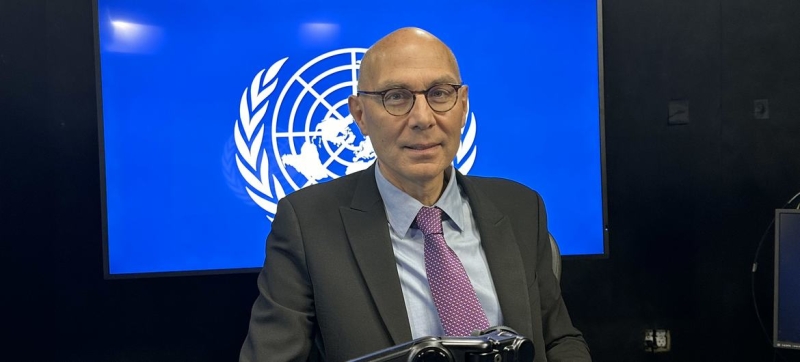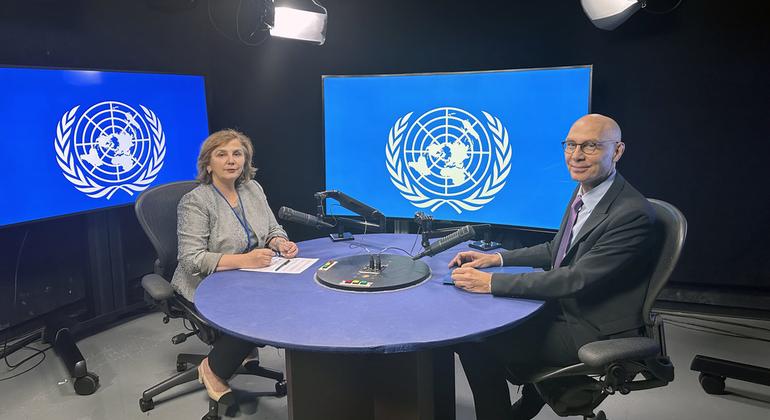
UN High Commissioner for Human Rights Volker Türk. INTERVIEW | Volker Türk on the deteriorating human rights situation, impunity and the future of international law Human Rights
UN High Commissioner for Human Rights Volker Türk believes that the work of international missions studying the human rights situation in Ukraine is extremely important: firstly, they tell the world about the suffering that the Ukrainian people are facing, and secondly, they document the violations that are taking place. Türk said this in an exclusive interview with the UN News Service.
UN News Service: I think it is safe to say that the human rights situation is deteriorating all over the world these days. What do you think are the main reasons for this alarming trend?
Volker Türk: Yes, we often hear that the human rights sector is in crisis, but it is important to be clear that it is not human rights that are in crisis, but their implementation and the political leadership that is needed to ensure that this implementation actually happens. Yes, in the world today there are too many wars, too much violence, too many autocratic tendencies. There is a suppression of civic space, which is paradoxical, because one would expect exactly the opposite.
UN News Service: How effective do you think the existing international mechanisms for the protection of human rights are?? These instruments have helped prevent wars and other atrocities in the past. But can more be done to meet the changing world??
FT: It is very important that human rights mechanisms are used in practice. The Human Rights Council, my office, the special rapporteurs, are bringing attention to human rights issues both in and outside of conflict, and making sure that no one is left behind. This is really key to all our work, because if people are left behind, then big problems arise.

UN News Service: Let’s turn to the Middle East. Every day we receive evidence of alleged large-scale violations of human rights and international law. What worries you most about this situation, and what impact might it have on international law in the future?
FT: I am very concerned that all sides are moving towards extremism and escalation. There is no longer any talk about how to establish a lasting peace. We only see escalation after escalation, as if violence can solve anything. No, it is just the opposite. There must be a ceasefire, the unconditional release of all hostages. This endless cycle of violence must end. Negotiations must begin on a peace process that will ultimately lead to the creation of two states where Israelis and Palestinians can live side by side in peace.
UN News Service: Do you think that current events could affect the future of international human rights law??
FT: I am concerned about the way international and humanitarian law is being trampled on at the moment because the whole world is watching. Others can take advantage of this situation and say that if it is happening here, it is okay to do it somewhere else. I am very concerned about the erosion of international law when it comes to the fundamental rules that we must follow in waging war and in our interactions with state institutions.
UN News Service: There are currently at least two missions operating in Ukraine that are documenting ongoing violations. These are your office’s Monitoring Mission and the Independent Commission of Inquiry. How important is this work, in your opinion? And how difficult is it to collect information, truthful information in the current situation?
FT: Human rights mechanisms – both what my office does and what the IC does – are based on a very strict methodology. They have to verify every fact, which is why sometimes you see that our figures are behind the reality. We have to verify every incident, whether it’s the number of casualties or the destruction of civilian infrastructure. Reports always take a long time to write because we have to do a very thorough job of establishing the facts and making sure that the stories of individuals are not forgotten in the current, very dehumanized environment that, unfortunately, war has.
It always takes a long time to write reports because we have to do a lot of careful work to establish the facts and make sure that individuals’ stories are not forgotten in this very dehumanised environment.
UN News Service: Some people, particularly in Ukraine and some other parts of the world, might say, well, here’s another report, and yes, it calls for action to stop torture and things like that. But in reality, nothing is going to change…
FT: For me, fighting for human rights is about establishing the facts and applying the law fairly. We analyse the facts and draw conclusions. But it’s also about compassion. We must show pain and suffering so that people understand that war is an absolutely terrible thing. It means death and destruction that we must prevent.
UN News Service: Large-scale sexual violence has been described as a characteristic feature of the crisis in Sudan. What is the role of the UN in preventing impunity in this context??
FT: My office, the expert I appointed and the fact-finding mission recently established by the Human Rights Council are there to monitor violations, document them and report on what is happening. It is very important to us that what has gone unpunished in the past is punishable. That there are effective mechanisms for accountability, that the International Criminal Court is extended beyond Darfur to cover the entire situation.
UN News Service: In Haiti, gangs continue to terrorize the population. You advocate for the intensification of the work of the international mission in this country. How can we ensure that the mission’s actions put an end to human rights violations?
FT: The security situation in Haiti is extremely worrying. More than 3,900 people have been killed this year. Hundreds have been kidnapped. Many have been wounded. Obviously, the multinational support force that was deployed there assisted the Haitian police in their work. In addition, we must stop the flow of weapons coming into the country. The weapons are not made in Haiti. They come from other countries. And we must make sure that the people behind the gangs are actually sanctioned. A comprehensive approach is needed there, and it must be applied immediately.
UN News Service:What would you say about the rise of populism, discrimination and disinformation in developed democratic countries? This makes your job more difficult?
I would like to appeal to all those who vote: analyze political programs from the point of view of human rights!
FT:This year is a year of big elections. About four billion people are voting. I would like to appeal to all voters: analyze political programs from a human rights perspective! Do they promote the protection of human rights for everyone or do they marginalize, stigmatize, scapegoat certain parts of our society? For example, we hear a lot of talk about refugees and migrants, often in very crude and derogatory terms. This is unacceptable. It is a dehumanization of other people. My appeal to all voters: if this happens to one part of society, it may happen to you one day. So you have to be very careful.
UN News Service: Let’s talk about new technologies and how they affect modern life in the context of human rights situations around the world.
FT: It’s clear that digital developments, technological advances, are a huge advantage. They can help us achieve the Sustainable Development Goals. They can help us solve many of the big problems of our time. But at the same time, as we know from the experience of the big social media platforms, they can also lead to huge problems. Artificial intelligence brings potential risks. We have to be careful, always take human rights into account and develop the normative framework. I am very pleased that the Global Digital Compact contains very strong language on human rights. We will provide services to countries and companies around the world so that they can meet their human rights obligations when adopting technological innovations.
UN News Service: You still believe that risks can be prevented?
FT: It’s still a few minutes until midnight, so to speak. We still have time, but as with climate change, we must act quickly and efficiently.
